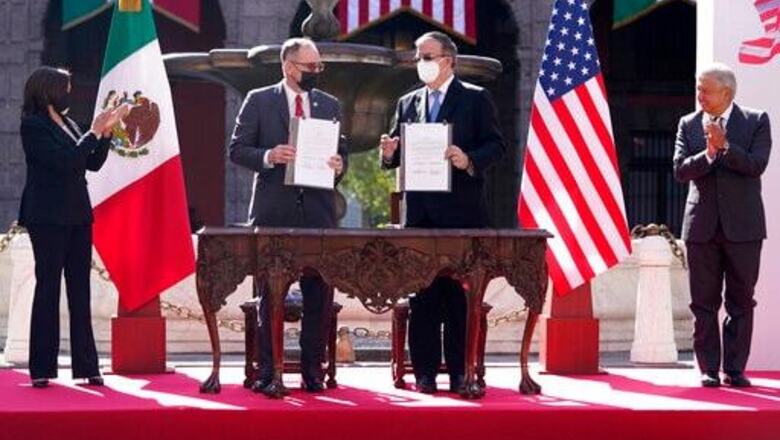
views
MEXICO CITY: A gathering of leaders from Latin America and the Caribbean in Mexico this weekend is the latest sign of that country flexing its diplomatic muscle as it looks to assert itself as the new mediator between the region and the United States.
Whether or not Saturdays meeting in Mexico City of the Community of Latin American and Caribbean States, or CELAC, culminates in a rumored mass exodus from the Organization American States, Mexico has signaled that it wants a leadership role in Latin America after years of focusing almost exclusively on its bilateral relationship with the U.S.
It was precisely the closeness of that relationship that President Andrs Manuel Lpez Obrador cited in July in proposing Mexico help the region open a dialogue with the U.S. government to reorient a relationship based on a two century-old model he said has no future.
Turning their backs on the United States was also not an option, Lpez Obrador said. It is time to express and explore another option: that of a dialogue with U.S. leaders and to convince and persuade them that a new relationship among the countries of America is possible.
The president said Mexicos proposal was for something closer to the model of the European Union. In that spirit, you mustnt rule out the substitution of the (Organization of American States) with a truly autonomous body, a lackey to no one, he said.
Enter the CELAC.
Mexico was the organizations president last year and its membership voted that Mexico continue in that role this year.
CELAC has only existed for 10 years and is more left leaning, having remained on good terms with countries including Cuba, Venezuela and Nicaragua. Late Venezuelan President Hugo Chavez was one of its biggest proponents. But for long stretches, it did not even meet.
Unlike the OAS, the United States and Canada are not members, nor is Brazil, which withdrew in January 2020.
Mexico Foreign Affairs Secretary Marcelo Ebrard has been outspoken on the inequality and disparities in access to COVID-19 vaccines and CELAC became a vehicle for Mexicos efforts on that subject.
Mexico pursued a multi-pronged strategy of direct purchases and participation in the multilateral efforts to obtain vaccine. But at the same time, Ebrard worked through CELAC to produce the AstraZeneca vaccine in the region Argentina and Mexico and distribute it here.
Late last month, Ebrard addressed the ruling Morena partys senate delegation. As Lpez Obrador had a month earlier, he spoke of the importance of Mexicos relationship with the United States and how well things were going currently. Then he turned to the OAS.
The OAS became out-of-date because the world changed, Ebrard said. The OAS cannot continue being an instrument of intervention.
Goodbye OAS, in its interventionist, interfering and hegemonic sense, Ebrard said to applause. There should be another organization that we build politically in agreement with the United States for the 21st century and not the 19th century or the 20th century.
Hence the speculation that Mexico could lead other countries in leaving the OAS.
Along with its vaccine efforts in the region, Mexico has recently hosted a new round of dialogue between the Venezuelan government and that countrys opposition in Mexico City. Lpez Obradors administration had resisted pressure to recognize opposition leader Juan Guaid.
Lpez Obrador has asked the Biden administration to support the expansion of two of his signature social programs to Central Americas Northern Triangle to address the root causes of migration. Mexico’s president has been cooperative with the both the Trump and Biden administrations on immigration, deploying Mexican security forces to try to contain migrants in southern Mexico and allowing the U.S. to return non-Mexican asylum seekers to await their cases in Mexico.
On Thursday, Lpez Obrador hosted Cuban President Miguel Daz-Canel and railed against the U.S. economic blockade of Cuba. Mexico recently sent ships with food, medicine and fuel to the island.
Ana Vanessa Crdenas Zanatta, a political science professor at Monterrey Technological and Anahuac universities in Mexico City, said on one hand, Mexicos move to take a greater role in Latin America is positive.
For the first time this government is assuming a position in terms of foreign policy and Latin American leadership that had been demanded of Mexico many times and it had not responded to, Crdenas said.
But leaving the OAS would be a great risk, noting the organization has the membership and financial support of major economies like the U.S., Canada and Brazil, and still struggles financially. She said it is hard to imagine the CELAC being much more than a rhetorical and symbolic tool in the near future.
Withdrawal from the OAS could be especially costly in terms of human rights, she said. The OAS is the foundation of the hemispheres human rights and regional justice system.
The debate was aired during an OAS meeting Friday.
Colombia Foreign Affairs minister Marta Luca Ramrez said talk of replacing the OAS was worrisome.
Of course the answer must be no, she said. The OAS and CELAC can be complementary.
When you try to erase with a stroke of the pen the fundamental principles and objectives of the OAS and eventually move them to other settings were falling into an abyss, but above all its a huge mistake, she said. To think that our hemisphere is going to be better with its back to the United States and Canada is a great naivete, it is a great mistake.
During the meeting, Mexico’s representative, Luz Elena Baos, criticized the OAS for its policy of interference, arguing the organization had deepened the political conflict between countries.
She said Mexico did not believe in using the defense of democracy as a cover for meddling in countries’ internal affairs.
Rafael Elas Rojas, a professor of History at Mexico College and an expert in Latin American diplomacy, said Mexico is trying to lead.
I dont think it is improvised, theyve been working for awhile, Rojas said. But he expressed doubts due to how polarized the region is. Since the fall of the Berlin Wall there has never been a moment so low for Latin Americanism.
__
AP writers Claudia Torrens in New York and Mara Verza in Mexico City contributed to this report.
Disclaimer: This post has been auto-published from an agency feed without any modifications to the text and has not been reviewed by an editor
Read all the Latest News , Breaking News and Ukraine-Russia War Live Updates here.


















Comments
0 comment